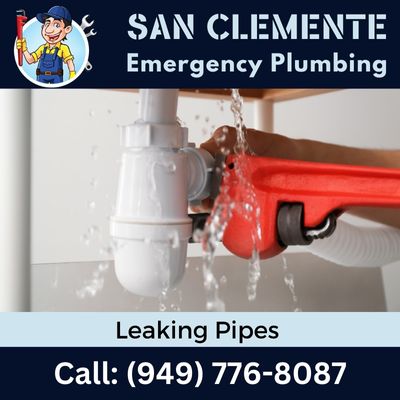Leaking Pipes
As a homeowner, you have many issues to consider about your home appliances. Many things could go wrong; if they do, your property could suffer significant damage. One problem you could face is a leaking pipe.
A leaking pipe is an unavoidable part of house ownership. Despite your best efforts, pipes can still suffer damage and, regrettably, send water shooting in the wrong places.
You should have as much information as possible about leaking pipes. Let’s explore some common causes of pipe leakages and how to fix them.
Call us at (949) 776 8087
Some Common Indicators That You Have Leaking Pipes

Learning the common indicators of leaking pipes is essential to finding a long-lasting solution. Here are some of them.
- Unpleasant Smell
Finding a musty odor in your bathroom or kitchen is one of the most evident indications that you have leaking pipes in your house.
Indeed, there are a variety of odors that may emanate from your bathroom, but this one is caused by mold growth. That musty odor is not only awful for your house's condition but also risky for your health.
This smell is bad for your lungs. It may become so bad that you experience pulmonary fibrosis, which, if left untreated, can develop into lung cancer. Do not ignore this indicator.
- Corrosion
Pipes are easy victims of corrosion. That is, they become rusty over time. This is caused by the chemical reaction between the metal and elements in the environment. This corrosion weakens your pipes over time.
Corrosion may eventually lead to holes, allowing water to escape from the pipes.
- Bad Pipe Laying
Piping systems should always be installed by an expert, especially in new residences. This is because lousy pipe laying is the cause of many leaks that result in emergencies.
Water must flow against gravity in piping systems. Thus, pipes and joints must be adequately installed, and backflow prevention devices must be utilized as necessary. When that is not done, you'll have leaking pipes.
- Broken Seals
Seals are found in a variety of places throughout your plumbing system. Most seals are not metal, but are made of rubber.
These rubber seals are installed around any connections your pipes have to faucets or other fixtures. Keeping the link waterproof is the goal of the seals. However, rubber seals aren't designed to last forever, which can be a problem.
With time, these rubber seals may deteriorate. They may also shatter or sustain damage. As a result, water can now escape from the pipe.
How to Get Your Leaking Pipes Fixed
Some resourceful methods for tackling leaking pipes include:
- Get a Repair Sleeve
A clamp and rubber patch combine to form a pipe repair sleeve, which tightly seals a broken pipe section.
These are available in most hardware stores, but you need to get the right one by measuring the leak length before buying. To carry out the fix:
- First, align the gasket with the damaged part of the pipe.
- Then place it over the hole so that it completely encloses the leak.
- Ensure the clamp fits snugly over the gasket when you wrap it around the pipe. The bolts provided on the outside of the clamp must be very tight.
- Get Epoxy Putty
Another quick and easy product to use for fixing your leaking pipes is epoxy putty. Follow the steps below:
- Identify the precise location where the pipe is leaking.
- Then prep the region by removing any remaining moisture with a dry cloth.
- After you have done that, use some sandpaper to remove any rust present near the damaged part.
- Make the epoxy putty mixture if needed.
- Apply carefully and fast on the damaged region because once air gets in, it begins to harden.
- Finally, allow it to harden completely.
Call us at (949) 776 8087
- Call the Experts
Most people consider the repair options above to be short-term fixes. For a longer-lasting solution, you need to call an expert plumbing company.
Choosing a professional plumbing company means you benefit from experienced workers using the best tools and techniques available to complete the repair. It’s that simple.
